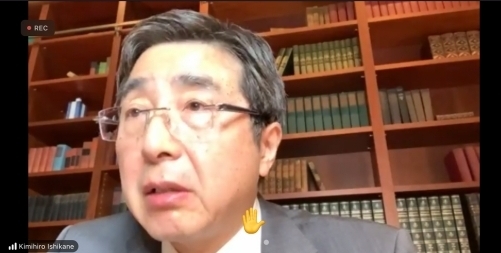平和構築委員会(PBC)とアフリカ連合平和・安全保障理事会(AUPSC)に関する大使級会合における石兼大使ステートメント
令和4年11月28日

Mr. Chair,
I thank you for organizing this meeting, and I am also grateful to all the speakers for their insightful remarks.
We continue to witness increasing human security crises in Africa caused by multiple factors such as conflict, terrorism, food insecurity, and energy shortages, as well as the COVID-19 pandemic and, today’s focus, climate change. Its impact such as environmental degradation and natural disasters becomes a multiplier of risk of violent conflict. The situations require us to fully utilize comparative advantages of each organ to effectively tackle the root causes and drivers of crises with a keen eye on adverse impacts of climate change.
In this regard, I would like to highlight the following points:
First, we should promote a holistic approach based on the Humanitarian-Peace-Development Nexus to synergize and mutually reinforce the efforts of all actors at each stage, from conflict prevention, peacebuilding to post-conflict transition, while considering the effects of climate change. The UN system needs to integrate the work of its own Agencies, Funds and Programs within, and enhance cooperation with other partners, such as the International Financial Institutions (IFIs), the private sector, and civil society. The UN peacebuilding architecture, among all, the Peacebuilding Commission and the Peacebuilding Fund, can spearhead the efforts with its unique mandate. A good example is the PBC ambassadorial level meeting on climate and security in the Sahel this March.
Another point is the essentiality of strong regional, national, and local leadership and ownership in close coordination with international partners for any successful initiatives. Close and Effective partnership between PBC and AUPSC is required even more for it, and today’s consultation has deepened our understanding on the ground. We should continue to focus on building and strengthening institutions and human capacities at every level. Priority areas should include building community capacity in climate change mitigation and adaptation. Secretary-General’s initiative to have every person on Earth covered by multi-hazard early warning systems will be another example in this regard and that of reinforcing efforts of all actors. At the Eighth Tokyo International Conference on African Development (TICAD 8) this August, Japan announced to work towards human capacity development for 300,000 professionals in a wide range of fields including disaster risk reduction.
Aspiring to be “a partner growing together with Africa”, Japan remains committed to further supporting effective collaboration between PBC and AUPSC for the maintenance of international peace and security.
Thank you.
